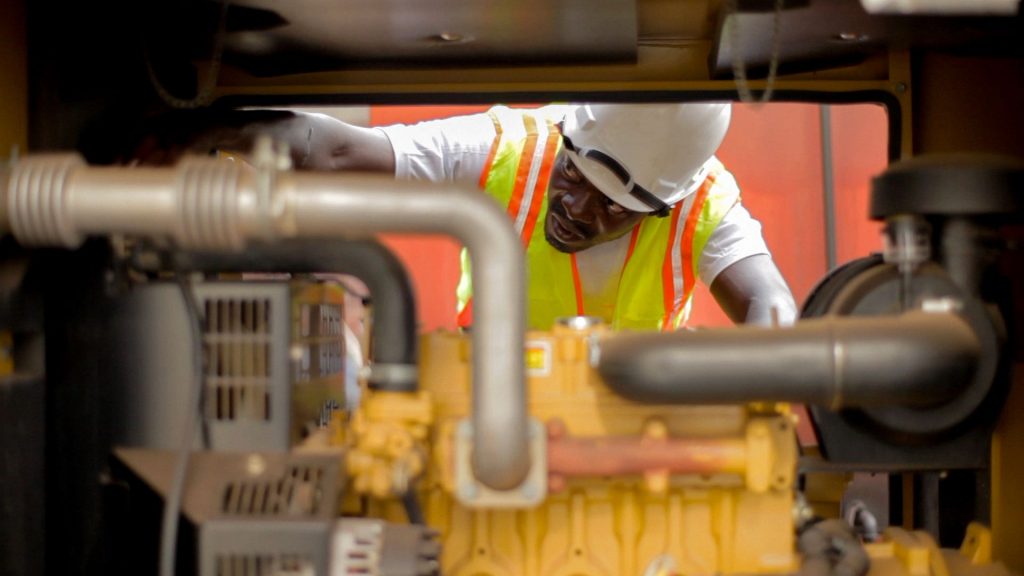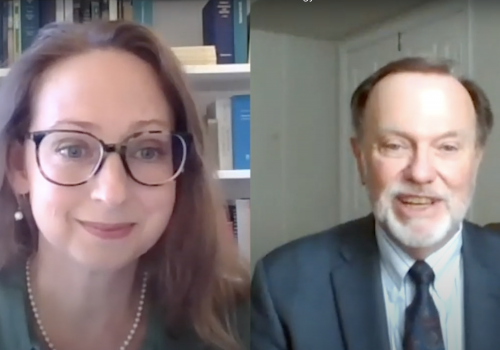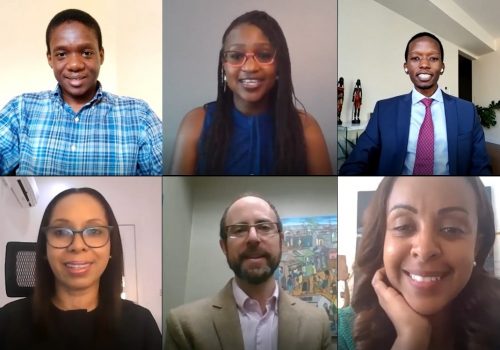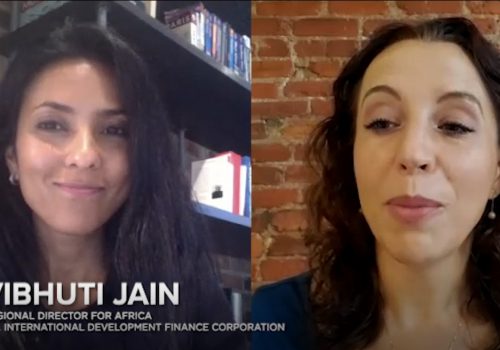Buoyed by bipartisan commitment and a new government agency, the United States has taken new and significant steps to help drive investment in Africa, strengthen the region’s dynamic economies, create lucrative opportunities for US and African businesses, and advance US foreign-policy goals in the region.
“America’s goal in [Africa] is to support locally led problem-solving for enterprise-driven growth, inclusive societies, and transparent, accountable governance,” US National Security Advisor Robert O’Brien said on October 16, as part of the opening session of the Investing in Africa’s Future conference hosted by the Atlantic Council’s Africa Center and the US International Development Finance Corporation (DFC). The conference marked a major push by the Trump administration, building on decades of groundwork by Republicans and Democrats, to mobilize the US business community to invest in Africa and to shift the primary means of US engagement in the region from providing aid to promoting trade and investment.
The Trump administration’s approach to Africa, O’Brien continued, “seeks equal partnership with African countries built on [the] principles of mutual respect, accountability, transparency, trade, and investment, all underpinned by the rule of law.”
Watch the discussion:
A key part of the United States’ strategy to build stronger partnerships in Africa is spurring investment and economic growth through the newly established DFC. Adam Boehler, CEO of the DFC, explained that “the African continent represents over half of the Development Finance Corporation’s investments,” encompassing a portfolio worth $8 billion for the continent.
Boehler joined Macky Sall, president of the Republic of Senegal, Filipe Nyusi, president of the Republic of Mozambique, and Ouhoumoudou Mahamadou, chief of staff to the president of the Republic of Niger, to discuss US investments in Africa and the prospects for economic growth throughout the continent.
Here are some of the highlights from their discussion:
Harnessing investment to drive growth
- Investment, not just aid: O’Brien noted the long record of US support for Africa, especially in “responding to natural disasters, vaccinating millions of children, [and] investing billions to combat HIV/AIDS, Ebola, and now sadly COVID-19 on the continent.” But he argued that the United States increasingly realizes that “private enterprise is the surest pathway to sustainable development.” He explained that “US economic growth and outward foreign direct investment, which totals $6.5 trillion, has done even more good for the globe than our humanitarian assistance,” which has prompted a bipartisan majority in Congress and the Trump administration to turn to institutions like the DFC to help spur more US investment in African businesses and projects.
- A new toolbox: O’Brien highlighted several new US initiatives designed to help boost economic growth in Africa. Prosper Africa, a cross-government initiative, helps “harness more than sixty trade and investment support services such as financing, advocacy, feasibility studies, and advisory services, to assist US and African businesses and investors to identify and close deals,” O’Brien said. The US Congress also “overhauled the Export–Import Bank, which in the last year and a half authorized more than forty deals in sub-Saharan Africa,” and the United States invested in several electricity, water, and infrastructure projects through the Millennium Challenge Corporation, O’Brien noted.
- A new, empowered investment agency: One of the most important new tools, O’Brien argued, is the new DFC, which “utilizes its unique private-sector financing tools from debt and equity finance, to political risk insurance and technical assistance, to drive private-sector investment and provide development finance solutions to the most critical challenges facing the developing world today.” Replacing the Overseas Private Investment Corporation, the DFC has received solid commitments from Congress, Boehler said, including a doubled funding base of $60 billion, an ability to invest in “re-insurance, debt, and equity,” and a mandate to “back projects that were both American-led projects as well as projects from other countries including the countries in which we invest, and that also lets us invest in building domestic capability.” This actions by Congress, Boehler added, prove that “investing in our allies and emerging countries is not a Democratic or Republican sentiment. It’s an American sentiment. And it shows the strength and focus [in] Congress in what the Development Finance Corporation does.”
- Making tangible progress: Despite being less than a year old, the DFC is already taking steps to spur investment, especially in Africa, Boehler said. On October 15, the DFC launched its first Development Strategy, which Boehler explained was “not mandated by Congress” but was undertaken because “we wanted to show everyone where we want to put our investments for maximum impact.” The DFC has also worked on a joint communique with other leading development-finance institutions in the region to increase cooperation, signed a letter of intent for a nuclear-power project in South Africa, and established a “deal team” operating throughout the continent to help identify new opportunities for US investors, Boehler said. He added that the DFC is aiming to invest nearly $25 billion in the next five years around the world.
Africa is ready for new growth
- Perceptions need to change: “Africa is a fast-growing continent, not only through its population but also through its opportunities,” Senegalese President Macky Sall said. One of the major tasks for the DFC and African leaders now is to “change Africa’s risk perception,” he explained, arguing that “the perception people have [on] the risk in Africa is not real. It is fictional simply because people think Africa is a poor” region. Filipe Nyusi, the president of Mozambique, highlighted that his country, along with others in Africa, have “plenty of experience” in doing investment deals, along with “measures of transparency, good governance, peace, tax breaks,…a stable legal framework, and free trade zones” that “show that there will be a return on investments.” Mahamadou, who gave remarks on behalf of Nigerien President Mahamadou Issoufou, argued that Africa also “showed its strong resilience and its preparedness regarding COVID-19,” where case counts and deaths have been lower than in other parts of the world.
- New economic expectations: Despite the region’s relative success so far in combating the pandemic on the public-health front, Mahamadou stressed that the economic damage has been considerable. “For the first time in twenty-five years, Africa went into recession,” he explained, which has “exacerbated” poverty and resulted in Africa falling further behind on its Sustainable Development Goals (SDGs). African citizens are also expecting more from their government, Sall said, as in Africa “democracy…is getting stronger and stronger and citizens are now expecting their leaders to do the right thing.”
- Investment needs to support the whole economy: While much of the investor interest in Mozambique has been from international energy companies looking to use the country’s energy resources, Nyusi explained that his government is focused on taking the returns from these investments and “apply[ing] them to other areas, among them agriculture.” Mozambique wants to transform the agricultural sector from being just for “subsistence” into an export industry, he said, “tapping into the international market and…into existing markets like the United States.” He said that his “ultimate goal is to diversify our economy,” and help create new jobs, especially “for women and youth.” Mahamadou argued that Africa’s abundant natural resources should “be tapped into to develop industry, to develop infrastructure, to develop all these to make [an] African continent that will emerge [better] after this COVID-19 pandemic.”
Providing Africa with a new choice
- Beware of China dependence: O’Brien warned that the United States’ emphasis on enterprise-driven growth and strengthening the domestic economies of African partners “stands in stark contrast to [the values] of the Chinese Communist Party.” He argued that China’s use of massive long-term loan deals and strict conditionality entraps recipient countries in agreements that ultimately benefit Beijing, rather than Africa. “Whereas Beijing promotes a journey to China dependence, the US promotes a journey to self-reliance,” he stressed.
- Why China remains attractive: Sall said that he is “very happy to see that Americans are concerned about the sovereignty of African countries,” especially as the continent celebrates “around sixty years of independence,” but he argued that “the projects we implement with our partners will not suffer from any encroachment on our sovereignty.” He stressed that “Senegal is a country that is open to all partners” with “no exclusion whatsoever.” He explained that China has often been the only source of long-term financing for the continent, offering loans “over twenty-five [or] thirty years…with an interest rate that is not over 2 percent,” which African governments would not be able to get through private markets and which are critical to financing big infrastructure projects. “We don’t want our friends to see China’s [investment]…as a threat to [our] partnership with them,” he said.
- An alternative? This lack of long-term financing options is exactly what new US projects are meant to rectify, Boehler said. Through initiatives like Prosper Africa, the United States hopes “to really provide the types of long-term loans and ensure that there is a very significant alternative to all African countries.”
David A. Wemer is associate director, editorial at the Atlantic Council. Follow him on Twitter @DavidAWemer.
Further reading:
Image: Photo courtesy of the US International Development Finance Corporation.



